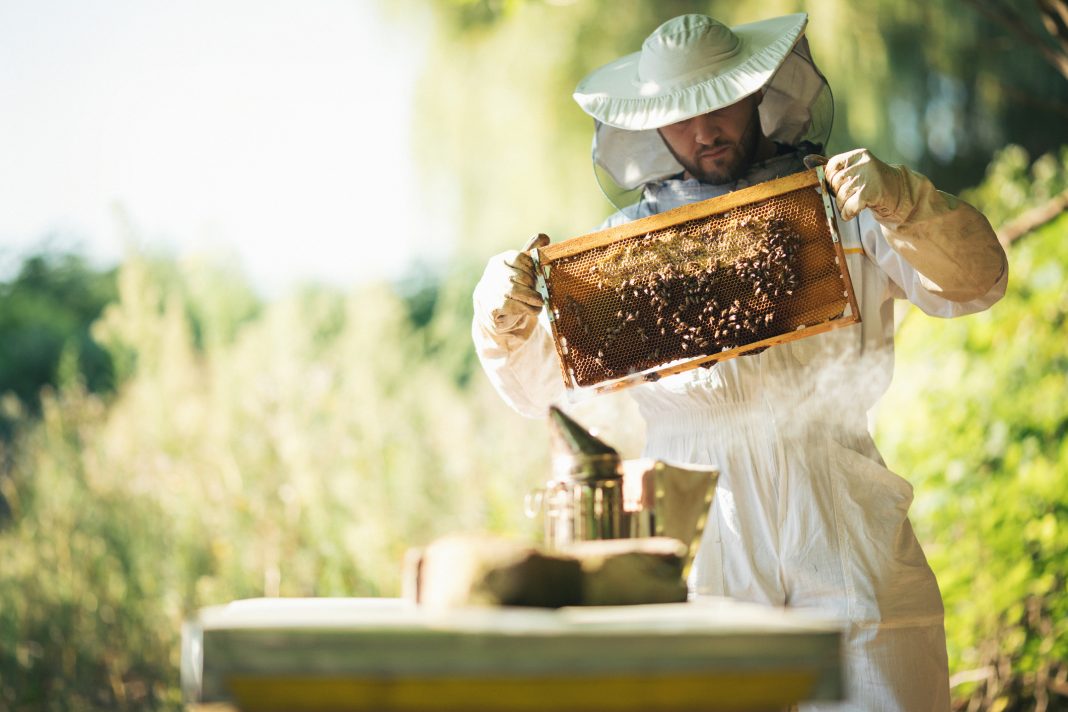Aleksandra Tymczak studies the beekeeping and honey industry, which is an established sector of Alberta’s agricultural system. In this article, she emphasizes the importance of knowledge within the industry and the growing capacity of grassroots extension services to both share and acquire knowledge
Beyond education, new beekeepers and honey producers increasingly gain knowledge from more mature honey producers or other new honey producers across the agricultural system through extension organizations. Extension organizations fill a critical gap that has become present in the agricultural system for new farmers, presenting opportunities for networking and critical problem-solving:
“As a beekeeper with a lack of resources out there, you’re the producer, you’re the researcher, you’re trying to do extension, you’re just everything, and we’re not all built for that” (Honey Producer).
Challenges faced by beekeepers
The educational component of extension is valued in the agricultural system. This is being especially echoed by honey producers, who criticize the lack of formal and informal education initiatives within their industry.
“Because we have seen so many new beekeepers come in, there needs to be good extension programs out there. A significant portion of beekeeping involves trial and error. It’s experience; there’s no college course you can take. There are books you can read, but the books are written by researchers who were alive 200 years ago, and a lot of it still applies today, but we’re all in different climates, microclimates, and regions [of the province]. You almost have to talk to other beekeepers or agriculturalists who do understand what’s going on in that region. So, understandably, [new beekeepers] struggle with trying to keep up with things” (Honey Producer).
Although provincial-level and federal- level beekeeping associations hold meetings once or twice a year, many beekeepers are isolated in their provinces due to being in remote rural locations. Previously, beekeepers were predominantly located within the Peace River region of Alberta; however, they have since been emerging and spreading out to the southern regions of the province, as well as the northwest and northeast regions.
In some of these remote locations, beekeepers lack adequate internet access or connections, making communication and networking a significant challenge.
There are also growing concerns about the changing landscape of honey producers.
“I have no problem with people wanting to do this as a living. This is my 33rd crop of the year, and I’m learning every day. Every year has its own challenges, but you’re always adapting and learning, and you have to be that way, because if you’re very rigid on what you’re doing, you’re going to set yourself up for failure. [New beekeepers] just don’t have the experience, and so they’re going in blind, and I wish there were some way that resources were available for them. But also, they were willing to accept those resources… There needs to be more awareness, more education, because a lot of people go into it thinking it’s a cool hobby. They don’t really understand everything that goes into it.” (Honey Producer)
A new approach: Grassroots extension services
Recently, efforts have been made to rejuvenate or transition extension services by utilizing various actors and methods within the agricultural system, enabling new knowledge to be introduced into the industry. One example is grassroots initiatives, such as Connect for Food. The Connect for Food initiative evolved from a previous initiative called the Capital Region Global Food initiative. The project involved all municipalities adjacent to the city of Edmonton, focusing solely on developing the local food economy. The organization is structured as a learning organization that brings together stakeholders to share their ideas and experiences about creating a localized food community, thereby supporting economic development within rural communities. Extension services are conducted through virtual and in-person events. To date, the organization has been serving the northeastern regions of Alberta. There have also been other smaller organizations that have existed, focusing on local food systems within various areas of Alberta.
At the core, the Connect for Food initiative is based on the principles of engagement, empowerment, and enabling by connecting a diverse group of stakeholders in conversation and learning, introducing new forms of knowledge into the system. Unlike previous extension services that considered government officials and academic experts within the agricultural system, with Connect for Food, the farmers themselves are considered experts regarding the agricultural system. Each farmer is treated as an educator, and table discussions are arranged to facilitate a diverse group of stakeholders engaging with one another and learning from each other. More mature farmers are viewed as having the solutions themselves to the complex questions that new entrants may have based on their own experiences, expertise, and local knowledge. Therefore, it has also become a platform to allow for skill sharing between more mature farmers and new farmers, as well as an opportunity to dispense assumptions after learning about each other.
Lastly, it provides an invaluable opportunity for new farmers to get to know people and receive support. This set of activities became a perpetual cycle, marking the beginning of many new farmers’ products being introduced into restaurants and chefs connecting with growers to utilize their products.
“We’re trying to connect with the producer, the processor, the marketer, the distributor, the buyers, the chefs, the consumers, the educators, and the service providers – like nutritionists. It seems when you get people from diverse backgrounds to talk about a common subject like food, people can get behind it […] We are providing that space for everyone to come together and just get to know who’s out there and who they can work with and what everyone does. From this one meeting alone, they can develop networks and relationships and find people who are looking for the same things – mentoring opportunities and waste regeneration solutions.” (Connect for Food)
Reference
- Tymczak, A. (2025). Navigating Challenges and Opportunities in Alberta’s Small-Scale Agricultural Sector: Pathways for New Entrants, Knowledge Transfer, and Institutional Barriers. University of Alberta. DOI: [10.7939/81811] [https://ualberta.scholaris.ca/items/88b0ab26-c882-4aec-baf1-cd759c0ca388]


